This page is an automated translation of /nl/mindelo.html and is awaiting a manual review.

After such an ocean crossing, it is wonderful to lie in a relatively immobile bed without having to turn a watch. We also wake up with difficulty because a ferry passes by and we look out with one eye: "Oh, it's only the ferry from Vlieland". It takes a few seconds and we rub our eyes once more: "Vlieland? East Vlieland?". But hey, it really is! The text "Oost-Vlieland" is painted over but still clearly legible. Only the destination is no longer Vlieland but Santo Antao, the neighboring island of the island of Sao Vicente where we are now.

French:
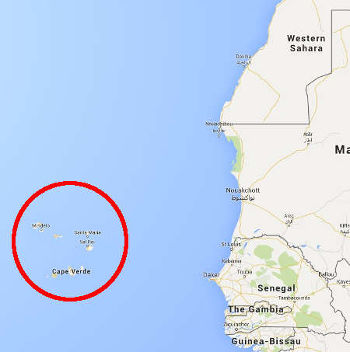
Today our first day starts on Mindelo, the capital of the Cape Verde Archipelago Sao Vicente. We will have to clear up officially, a process that promises to be somewhat complicated, but after that we are free to explore this part of Africa.
However, Ilona is not eager to start the day. She doesn't feel comfortable here. Last night, during our first brief acquaintance with the mainland, we already saw that there is great poverty here. The prices in the supermarket seem much too high for the local poor residents, would prices be driven up by more tourists? And we are here in our luxury sailing yacht that is packed with plenty to eat for months and expensive luxury items, all for the two of us alone. The worst part is that we stand out terribly here on land. We don't like to behave like tourists and prefer to mingle unobtrusively among the locals. But here we stand out terribly with our white muzzles; We might as well tie a flashing light to our heads: Here we are, the rich whites who come here like disaster tourists to marvel at the poverty here. Disaster tourists, because this country has suffered greatly from the former European occupation and slavery and was left penniless by the Portuguese at the end of the last century.
Not that we're afraid of being mugged or something. Many European sailors come here and if things are not right, the news is spreading like wildfire in the sailing community. But Ilona in particular has the annoying feeling that they will look at her here with envy as a stupid white rich man who makes prices go up. But I wonder again whether this is precisely a part of our European culture, that social status is mainly measured by financial wealth. Perhaps people here experience it very differently. Anyway, we have to deal with the formalities today and we have to go into town anyway.
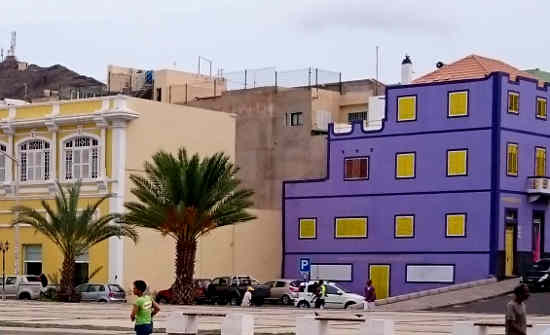
The city is directly the capital here and tourism is starting to play an increasingly important role here. And just like in most tourist cities, we expect to be harassed here by people who want to get a piece of this financial influx. But unlike in other tourist cities, we cannot avoid this by not pretending to be a tourist; we just stand out too much here and we are in fact large white dairy cows, well stocked with Euros, of which as many as possible have to stay behind in Cape Verde. We have not yet left the gate of the recreation harbor or, you see, that is where it starts, a black man approaches us. I still try to ignore it by looking the other way but there is no way around it. "Where are you going?" Just like a pushy salesman in a store, I try to get rid of it with "Oh, nothing special, let's just look around". Nice try, but with a look around he can help us very well, because he knows all the interesting things in the city. "Um, well, we just arrived and have to do some formalities first. And no, you don't have to come along, we know where it is, thank you. Maybe later, ok?" We walk away with convincing purposefulness as if we know exactly where we are going. "Hey, but you're walking the wrong way!" "Yes, that's right, because we have to withdraw some money first." "Okay, but I know where the bank is." Unsolicited, he explains exactly where we can find the ATM. Should we tip him now for this unsolicited information? We decide to just pretend we're crazy for a while and go hard to the bank. From the bank to the area where the customs clearance offices are, we have to pass the recreation harbor again and yes, there is that young man again. "Everything OK?" "Yes, thank you." "Shouldn't I help?" "No, we'll find it. Thank you, see you later!"

In the meantime, we enjoy the decor. We already knew the palm trees from the Canary Islands, as well as the colored houses. But instead of pastel colored, the houses are now brightly colored: they find a bright purple house with bright yellow shutters very common here. Pickup trucks tear past with people just standing loose in the back, the city buses have dents and doors are missing and it is apparently your responsibility not to fall out. Everywhere are brightly colored wooden boats on the beach. And there are dogs everywhere, which belong to no one in particular but seem to be welcome everywhere.
We have to be the first to go to the office for immigration, for passport control and stamps and stuff. In our pilot (travel guide for sailors) it is already warned that it is rather untraceable. It is an office somewhere in a remote building, but both the building and the office have no inscriptions and appear to look anything but official. It is busy in the street where it should be. There are large numbers of young men hanging around, all black of course. At the end of the street is a large gate with guards behind it. We are just wondering if we have not accidentally wandered into a bad neighborhood when one of the boys approaches us. In remarkably neat English he asks if he can help us with anything. We decide to accept the help this time and already have a Euro ready. Oh you have to go to immigration? Follow me! After 20 meters we are standing at an inconspicuous door in a building without any further indication and indeed, there are officially-looking uniformed men walking around. We think this was very little trouble for a tip, so we kindly say thank you and walk in. A bored-looking man takes our passports, flips through them, scans them, taps his computer. It all takes a long time, they hardly know here. When we look outside I see that our "guide" is patiently waiting for us. So we haven't gotten rid of that yet. After the passport control is ready, we have to go to the port police for the following formalities. He also seems to be untraceable, so we decide to use our patiently waiting guide for this and then give him his reward. He walks to the gate, says something to the guard, a bunch of keys rattles and the young people who are pushing in front of the gate give way reverently. Here too we are guided into an inconspicuous office. We give our guide a Euro and he responds surprised: "Oh but that shouldn't have been! You're welcome! But thanks anyway!" In the office we have to enter our names a number of times: "Owner of the ship? Captain of the ship? List of names of persons on board?" After we have finally finished this part of the formalities and we go out again, our guide has disappeared. But at the beginning of the street he is again. He waves us goodbye but apparently does not intend to force any further help on us. Now the situation has changed: He doesn't want anything from us anymore, we paid nicely for the help, so I feel safe to chat: "Why are all these people here?" He explains, again in flawless English, that there is a serious shortage of work in Cape Verde and that the port regularly needs people when a ship has arrived. The young people here wait patiently all day long for that to happen and then hope to be chosen to do some paid work. His name is Natal, he is the tenth child in a family of twelve children. His father had the foresight to teach his offspring English as well because that would increase the chances of a good future. Natal turns out to be a nice boy and he is as interested in our background as we are in his. He is now waiting for work from the port, but if he can be of service to us, we can visit and/or call him there.
We now want to go to the market because after a week at sea we yearn for fresh fruit and vegetables. On the way to the market we pass the harbor again and oh no, there is that one young man again! "Finished with the formalities? Good, where shall we go?" We tell each other that we should let him accompany us to the market, then give him a Euro, and then hope to be rid of it. On the way, the boy tells all sorts of things and reports in passing that today is his birthday. Yeah right! Another trick to increase the chances of a good tip?
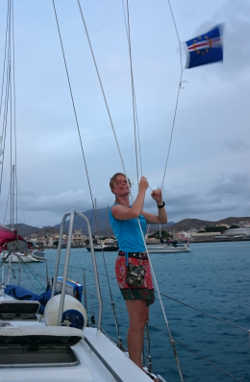
Not only do we go to the market to buy fresh produce, but we are also looking for a certain Mrs. Cole, a female on the market who makes flags, among other things. It is customary to hoist the flag of the country where you are a guest in the mast as a tribute. You can buy a Cape Verdean flag at the harbor office, but our pilot states that there is also a stand on the market where a female sews the flags herself. We think that would be more fun, and if we then prefer to spend money directly on the person in the bottom layer of the financial pyramid. It is a busy market with little distance between the stalls and people everywhere try to get your attention and sell something. It is good that we have Aleandro with us. We experience his presence as a kind of shield through which others leave us alone.
After we have obtained our guest flag and have already bought a Surinamese copy, Aleandro suddenly starts talking Dutch to us! I am shocked, our secret language has been betrayed, and I try to remember in what words I had conveyed to Ilona to get rid of that guide. With a grin, Aleandro pulls out a worn-out van Dale dictionary from his backpack. When he has nothing to do, he uses the dictionary to learn words. During the day he tries to earn money by helping tourists so that he can go to school in the evening to learn languages. Look, he has a few more dictionaries. He is actually a funny young man and handy to show us the way, so we decide to keep him for a while and offer a drink. We only add a piece of cake; after all it is "his birthday"? We already think that it is nice to be able to mention his name in the blog, but how do you write that name exactly? Aleandro conjures up his ID so we can copy the name. My eye falls on his date of birth ... and sure enough, it does say November 2, 1980! So it's really his birthday! I quietly feel ashamed about my suspicion and adjust my ideas about the "pushy guides" a considerable number of degrees. In any case, they are men who do not give up but do their best to work for a living and try to increase their chances of finding a job through study. Aleandro announces that it is time for him to leave because he does not want to miss his school. He is very happy, smiles all the time and says that he had such a nice birthday and that it was so nice to meet us. We also had a great time.
In the meantime we have noticed that despite the poverty there are no beggars. The Cape Verdeans just want to work for their money; the only problem is that there is not enough work. What also strikes us is that there are stray dogs everywhere but that no one is ugly to the dogs. They are accepted, can lie anywhere, people sometimes spontaneously play with the dogs. The dogs all look pretty good and are not shy towards people. Despite what we see as chaos on the street, it is clean, we do not see any waste. There is a friendly atmosphere in the street and everyone seems to know each other. Our guides stop regularly to greet someone and we are often introduced. After a day we have the idea that we already know a lot of Cape Verdeans.
Ilona:
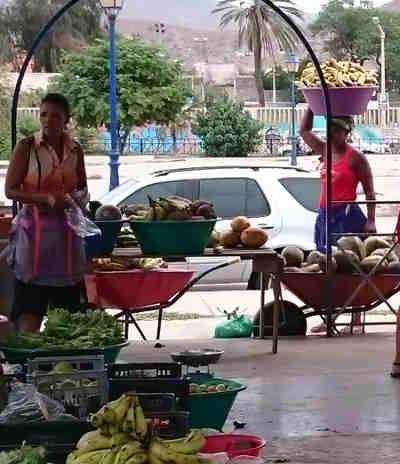
A bit of a shame, but I have to draw this conclusion: I am a Dutch provincial, actually I have seen very little of the world, especially when it comes to other cultures. Okay, in Europe, America and Canada there are really interesting differences in the way of thinking and living, but nothing really shocking. Now I was born in Friesland, living in Groningen as a student, settled in Drenthe until I was 35, suddenly in Africa and that gives a shock! And I didn't expect that actually, because I didn't feel that provincial at all, not as if I hadn't seen anything and I have certainly read a lot about it in all kinds of books and got through my sister who worked and traveled in Africa for a few months. A day in Mindelo makes me feel like I'm on an emotional rollercoaster. I am white, I stand out, I don't know the customs here, I don't know the people. I suddenly realize very intensely what it must be like for a refugee to leave his home and hearth and hopsakee to be very vulnerable among completely different people, but they are not doing that for fun like us and cannot go back !!!
Frans already told me that the morning we woke up here, I didn't feel so happy and weighed down. Yet I was also very curious about the people. The conversation with Natal was very interesting and Aleandro said it is good that the tourists are there as it generates a much needed extra source of income. I started opening up more and more and really enjoying communicating with these people.
Back to the point where Aleandro took us, looking for Mrs. Cole to buy a guest flag. Aleandro walks half a step ahead of us and leads us through a maze of streets. People and dogs sit, stand and lie everywhere. Beautiful colors everywhere. Smiling faces, friendly looking people. No tourists, we are the only white people walking around here. Women try to sell their fruit and vegetables in random places on the street and I spontaneously buy slightly too ripe bananas from a sweet-looking young woman who looks like she knows that nobody really wants those bad bananas anymore and she radiates when proven otherwise . I seem crazy that I just buy her bananas because the quality of many others is clearly much better, but I give it to her and the result is that we are both happy. She with the sales and I because I helped someone and I feel better than if I had better bananas.
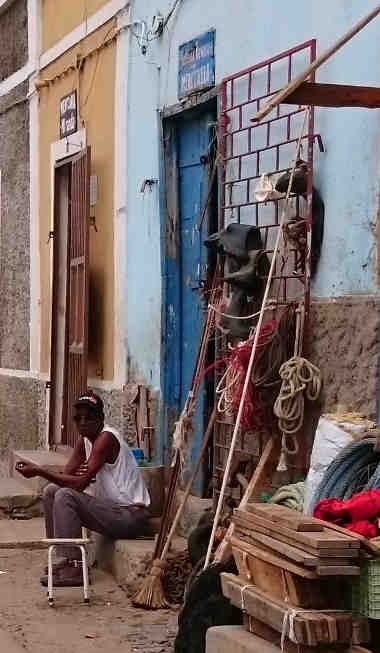
We're getting closer to the African market, this is where Mrs. Cole should be. Our guide does not know who she is but asks a few men if they know. The first does not know, but it is a cheerful pitch-black man who asks us where we come from and whether we have been here before. He has whole stories in good English, is interested in us and would like to give us a necklace. That chain protects and brings good luck. Before we know it, he's around our necks. I ask how much that costs and he is indignant, it is a gift! I also know that he is a smart guy who increases his sales opportunities when we come back later because he sells those beautiful carvings that we white people love so much and he is not the only one who does that, there are many more stalls around him with that kind of woodwork but of course we will buy from him. Still, I give the clever kiss a thank you.
The stalls are getting closer to each other, now there is barely a meter and a half in between all the cheerful colors with beautiful fabrics, images and other fun things. Here it is less poor than before on the streets, here people have really nice things that they sell. It is certainly not cheap, the prices are higher than in the Netherlands. Of course those are tourist prices, but even if you really don't want to have something, the final price will not be low at all. After a few more questions we arrive zigzagging at Mrs Cole! She is still there and she still sells guest flags. A sweet, introverted woman who speaks good English again. Unfortunately she doesn't want me to take a picture of her and her stall so I respect that. It is a shame because it is a beautiful sight to see her sitting behind her old-fashioned sewing machine in her small shop, surrounded by a rainbow of beautifully colored fabrics.
As Frans said, we end the day by going for a drink with our guide Aleandro and of course we also treat him to a birthday cake. It is great to talk to someone who was born and raised here. He is happy here because there is a lot of fun and he likes to play football and volleyball on the beach and they seem to do that a lot. It is very bad that there is too little work, he admits. I am very positively surprised at the fact that he has at least 6 worn out textbooks in his bag, dictionaries and other language books. He reads dictionaries in idle hours so that he keeps improving himself and making more opportunities for work. Smart, just like Natal's father who raised his children in English.
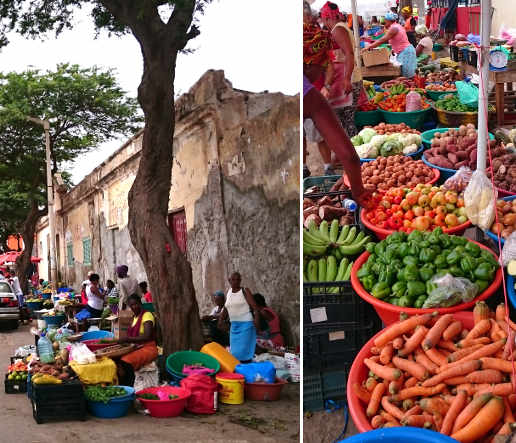
The next morning Frans and I walk to the market together. We now really know where we want to go and that means that there is no one offering their services. And you know? When we later walk through the streets and stroll around the market, we experience it as a real shame that we have no one with us. Funny thing is that yesterday we were still uncomfortable when the young men asked us if they could help and now we are already sorry that no one is with us. It feels safe when someone walks with you and it is very pleasant and fun to talk to a local. Our silent wish is suddenly fulfilled when we want to buy something and do not have enough money. The clever sales lady arranges for a friend to accompany us to the ATM nearest to you. I introduce myself with a smile and ask who he is. His name is Malik, a pitch-black young man and in his very poor English he says that he is from Mali. Ah, "Vouz parlez Francais?" I ask. His face brightens and he bares his white teeth. "Oui, oui, je parle tres bien Francais!" I can practice my French. It is a boy who fled Mali three years ago, in search of a better life with more possibilities. He is here alone, with no family, the intention was to make money and create the opportunity to bring his family over but instead he is stuck here now. There IS no work, no money, and no chance for him to even go home! His family is there, he is here and there is simply no money for a ticket home. He really wants to get out of here but keeps saying that he knows he has to stay calm. Doucement, doucement. He says it with a smile but I can see that he is really hurt. Ouch, this hurts! He asks if he cannot sail with us, he will keep very quiet, we will not be bothered by him and maybe he can earn money in another country to move forward, he says. Unfortunately I have to disappoint him, but he understands that ... Gatsie, I think this is really bad, but we also have a nice walk and again we feel the protective effect of a guide. It prevents (just like the Aleandro), a few times that Frans or I get under a car. We look like a few chickens without heads, as we all of a sudden don't have such good traffic insight at all. It is strange, at home someone never has to pull me over because otherwise I walk under a car and here that happens to both Frans and me a few times. Not that the cars are speeding but it's just somehow very different here and we need to build our traffic avvy. We say goodbye to Malik, tip him for his help, and I'll write down his name and phone number in case we'd like to go out with him again.
As I write this I hear a loud ship's horn and see through the window a hundred-storey cruise ship arriving, which means a huge load full of tourists with big bellies, golden watches and big cameras who will hopefully buy a lot of things from the people on the street! The cows must be milked. And there is a hurry, because these cows go back to the barn at 8 am. The boat sails away again in the evening. A visit to the Cape Verde for an afternoon is apparently enough for these people. Later we speak to a German on the market who comes off that boat. He likes that floating apartment building so much that he has been doing this twice a year for five years. Today he is in Mindelo for the ninth time. But we quietly think we've seen more in one day than he has seen in nine times ...